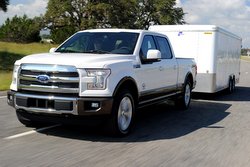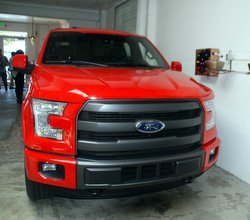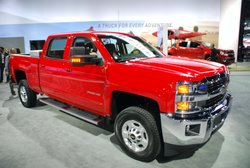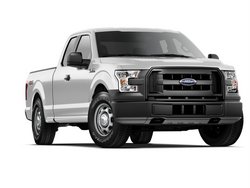The Best-Selling Vehicle in America May Have More Tricks Up Its Sleeve

It’s been no secret that Ford has been eyeing an F-150 hybrid full-size gasoline-electric pickup truck for some time. In 2011 Ford and Toyota announced an agreement to jointly work on a production hybrid system for trucks and sport-utility vehicles and the expectation was that a Ford F-150 hybrid would appear relatively soon.
The hybrid system developed by the two automakers would be engineered to excel at towing while delivering exceptional fuel economy. It would be used in Ford’s F-150 as well as the Ford Expedition and Lincoln Navigator SUVs. Toyota would employ the system in its Tundra pickup and Sequoia sport ute.
But, like many collaborations between automakers, this one didn’t last long. After two years the partnership ended with Ford saying at the time it would continue independently with the development of a hybrid truck, and that hybrid SUVs could eventually be added to its lineup as well.
After the break up, other than a few rumors, little was heard about an F-150 hybrid until a December 2015 interview with Ford’s product development chief Raj Nair in the Detroit Free Press. Nair told the paper’s auto critic, Mark Phelan, that Ford is “working very hard” on a hybrid system for the workhorse F-150 pickup. He added that it was too early to talk about how the system works or when it might debut.

Shortly after the Free Press interview, the company’s CEO, Mark Fields, confirmed the production of a hybrid pickup — and other interesting things — during an interview with NPR’s Ari Shapiro. When asked if the automaker was looking at an electric truck in the future, Field replied, “Well, we do have plans to have a rear-wheel drive hybrid truck by the end of the decade. So yes, we’re working on electrified F-series, and it’s really around a conventional hybrid.”
Following the norm of automakers regarding future products, Fields did not reveal any details about the future hybrid offering, such as which gasoline engine would be used or if a plug-in hybrid was also in the works.
The CEO did say that larger numbers of hybrids and plug-in electric vehicles would become “necessary” over the next decade or so, both because of “consumer demand” and regulatory requirements.
As for the “other interesting things,” Fields revealed Ford’s plan to move into ride sharing services, and compete with companies like Uber and Lyft. That is connected with the company’s recently announced $4.5 billion spending commitment to launch 13 new electrified models by 2020.
Not the First Hybrid Pickup Truck
For a number of years, Detroit automakers Ford, Chevrolet and Dodge (now Ram) have been working hard to improve pickup truck fuel efficiency. In 2005, General Motors introduced what it
called “hybrid” versions of its Chevrolet Silverado and GMC Sierra trucks. They incorporated what was essentially a sophisticated start-stop system.

The electric motor provided an assist to the gas engine from a stop, and also provided operation of power tools off AC outlets in the cab and cargo bed. While fuel economy ratings of 18-mpg city and 20-mpg highway made the trucks the full-size pickup fuel economy champ at the time, the trucks were only available as very well-equipped extended cab body models, plus an additional $2,500 for the hybrid system. The nearly $40,000 price tag didn’t have many takers and GM discontinued the trucks two years later.
GM didn’t give up on hybrid systems, however. In 2009 the company introduced its “two-mode” hybrid system for Chevy and GMC full-size SUV and pickups with either two- or four-wheel drive. Fuel economy was an impressive 21-mpg city and 23-mpg highway. But again, the vehicles were loaded, top-of-the line versions and the prices didn’t justify the gasoline fuel savings. GM dropped the hybrid models at the end of 2013.
GM more recently announced the return of mild hybrid technology to its pickup lines, this time using its eAssist technology to give a low-cost (about $500) fuel economy improvement. They expect to sell a limited numbers of these trucks in 2016 exclusively in California.
Is a hybrid pickup appealing to you but you don’t want to wait until the Ford F-150 hybrid arrives or don’t live in California where the Silverado/Sierra hybrids will be offered? You don’t have to. While it’s not a Ford, Via Motors offers its range-extended (think Chevy Volt) VTRUX. It’s a converted Chevrolet Silverado that the company says can travel 40 miles on electric power alone.
Bold Move By Ford
To put it mildly, a hybrid F-150 pickup is a bold move by Ford. It’s the automaker’s single most important vehicle; the top seller and profit machine that pays the light bills in Dearborn.
But Ford isn’t afraid to gamble with their top seller. A few years ago they placed a huge bet that truck buyers would accept a twin-turbocharged V-6 in a full-size pickup. They won big time on that one.

Another big gamble was the aluminum bodied 2015 F-150. It’s on track to sell around 750,000 units this year — another big win.
CEO Fields specifically stated the Ford F-150 hybrid would be rear-wheel drive. That eliminates the extra weight of four-wheel drive and guarantees maximum fuel economy, a smart choice.
It seems to me that if Ford wants to have any kind of success with the new hybrid truck they should learn from GM’s big mistake—don’t offer it only as a fully loaded model.
Related Stories You Might Enjoy:
Tech: Ford Has Confidence in Its Aluminum Path to MPG
Tech: Ford Sees the Way to MPG Through Lightweighting
Road Test: 2014 Chevrolet Silverado
First Drive: 2015 Chevrolet Colorado & GMC Canyon
Road Test: 2015 Ram 3500 Cummins Diesel

I think the key words in this report are “regulatory requirements.” I don’t believe there are many F150 owners that are wishing to have an electric/gas hybrid. I’m looking forward to the 10-speed transmission for 2017. Not interested in the start/stop technology or the turbo-charged engines. Just give me a nice V8 that is strong and reliable.
@Ford (if that’s your real name),
Your point is well taken–except that Ford is already well-down that road with an increasing number of turbocharged V6 engines replacing traditional V8s with no loss of performance or durability. You’ll note from the story that Ford is not going to offer any engine that doesn’t meet your towing requirements. All we can say is, give it a chance. Drive it, and see if it doesn’t work for you. If it doesn’t, I’ll wager there will be other F-150 models that will fill the bill for you. Or Chevys, GMCs, Rams, Toyotas or Nissans more than willing to let you give their offerings a try. –ed.